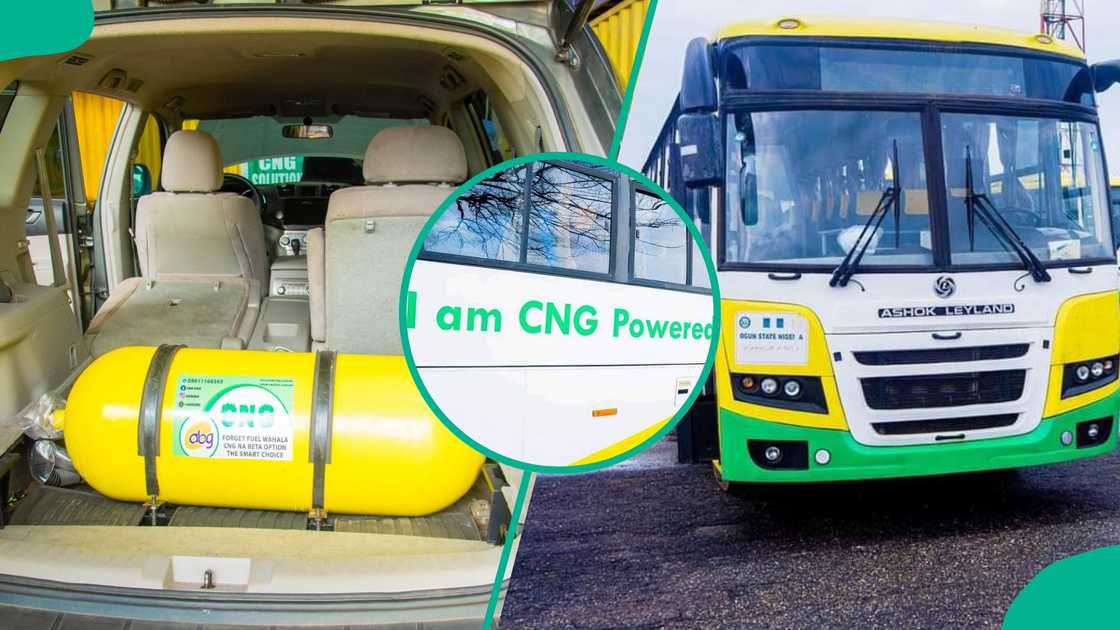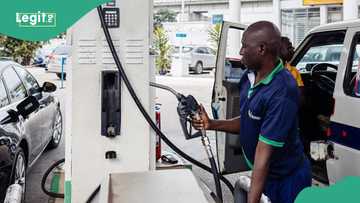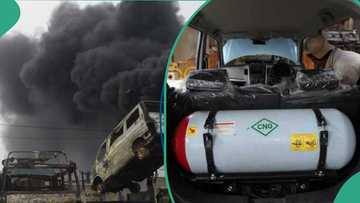Are CNG-Fueled Vehicles Safe? Expert Speaks as Nigerian Govt Promotes Adoption
- Nigerians are grappling with the sharp increase in petroleum prices, which have reached new highs in recent days
- Following the surge in the petrol cost, the FG intensified its campaign for the adoption of CNG; however, many Nigerians have expressed concerns about its safety
- Dr Ebenezer Odekanle, head of the Department of Chemical and Mineral Resources Engineering at Abiola Ajimobi Technical University, weighed in on the issue in an interview with Legit.ng
Don't miss out! Join Legit.ng's Sports News channel on WhatsApp now!
Ibadan, Oyo state - Many Nigerians could not contain their frustration after the NNPC sold petrol at an outrageous N1,030 per litre at various outlets on Tuesday, October 8.
This increase comes amid the breakdown in the relationship between NNPCL and the Dangote Refinery. The corporation directed marketers to begin interfacing directly with Dangote, effectively removing NNPCL as the middleman.

Source: Twitter
As the outrage continues online and offline, the federal government has intensified its campaign to accept cheaper alternatives, particularly CNG-converted vehicles.

Read also
Oil marketers promise to crash petrol prices as negotiations with Dangote refinery continue
Many government officials are actively leading the public relations effort for this shift, but Nigerians remain sceptical about the safety of using CNG, with concerns about potential explosions topping their list.
Should Nigerians adopt CNG-fueled cars?
Speaking with Legit.ng, Dr Ebenezer Odekanle, head of the Department of Chemical and Mineral Resources Engineering at Abiola Ajimobi Technical University, Ibadan, said the worries about CNG-fueled cars are not unfounded and should be taken seriously.
Odekanle, who is a former guest researcher at the German Biomass Research Center, DBFZ, Leipzig, Germany, added:
“If a car is a CNG-fuelled car right from the outset from the manufacturer, all these safety considerations may not be there since all factors would have been factored into the design.
CNG is compressed under pressure, making it very dangerous as it could pose a serious hazard, especially if it escapes due to cylinder failure or leakage."
He noted that high temperatures, which are common in Nigeria's climate, could “create a highly heated environment which, when mixed with air, could result in ignition or fire.”
CNG-fueled cars: Expert lists safety measures
Odekanle explained some safety measures to put in place when converting engines to CNG fuel.
The scholar explained that since fire requires the presence of heat, fuel, and air in the right proportions, companies responsible for engine conversions must ensure a design where these three elements are never simultaneously present in the correct percentage to prevent incidents.
Odekanle warned:
“To avoid negative occurrences, caution must be taken so that the location of the CNG cylinder is not exposed to excessive heat.”
He noted that the fuel tank for traditional engines is usually positioned under the vehicle, where it is cooled by fresh air while the car is in motion.
However, the proposed location of the CNG cylinder, behind the boot where heat abounds, raises several questions that need to be addressed, the university don added.
Another critical safety measure is the quality of the material used to produce the cylinder itself.
“The surface of the cylinder can be coated with heat-reflecting or heat-repelling colours instead of black, which absorbs heat. The cylinder must be resistant to heat,” Odekanle stated.
Is CNG truly affordable?
While CNG offers sustainable solutions to global warming issues, “as, with CNG, a significant reduction in emissions compared to traditional fuel is expected, which in turn is expected to enhance cleaner air in urban areas,” Odekanle did not entirely agree with the government’s foundational reason for pushing this shift.
He noted that the current abundance of underutilised CNG is primarily due to the lack of attention it received in the past.
Now that the focus has shifted to CNG, “it's possible that it becomes 'unaffordable' over time when demand exceeds supply,” Odekanle noted.
“As of 2018, there were approximately 12 million vehicles in Nigeria. If all 12 million were running on CNG today, I don't think the price of CNG would remain at 200 or 300 naira per litre as it is now," he told Legit.ng.
“Also, note that in Nigeria, no commodity remains stable in terms of price—not even a toothpick. As inflation rises, the price of CNG will also go higher. I foresee a situation where it will eventually become unaffordable.”
CNG-fueled cars: Good for humans and engines
Despite the reservations raised, Odekanle said the CNG is suitable for humans and engines.
He explained:
“Petrol and other liquid fuels contain higher carbon content than gas, which means burning liquid fuel produces more smoke or carbon monoxide (carbon-based substances).
“These substances compete with oxygen for haemoglobin in human blood cells. Instead of forming oxy-hemoglobin, they create carboxy-hemoglobin, which is a precursor to several diseases.
"On the other hand, there is no scientifically proven concern about the negative impact of CNG on engine performance; rather, it has a promising effect. In fact, CNG burns better and smoother, with lower emissions, enhancing the performance of CNG-fueled engines compared to petrol-fueled ones."
CNG: FG opens portal to convert cars and pay later
Earlier, Legit.ng reported that the federal government launched an application portal for Nigerians to convert their vehicles from Premium Motor Spirit, also known as petrol, to CNG.
The National Orientation Agency, in a statement titled “Payment Plan to Make it Easier to Switch to CNG,” announced that Nigerians can apply via the portal to convert their vehicles to CNG and spread payments through monthly instalments.
The statement noted that there are flexible payment options and assured applicants of support throughout the process with chances of quick approval.
Proofreading by James, Ojo Adakole, journalist and copy editor at Legit.ng.
PAY ATTENTION: Сheck out news that is picked exactly for YOU ➡️ find the “Recommended for you” block on the home page and enjoy!
Source: Legit.ng






